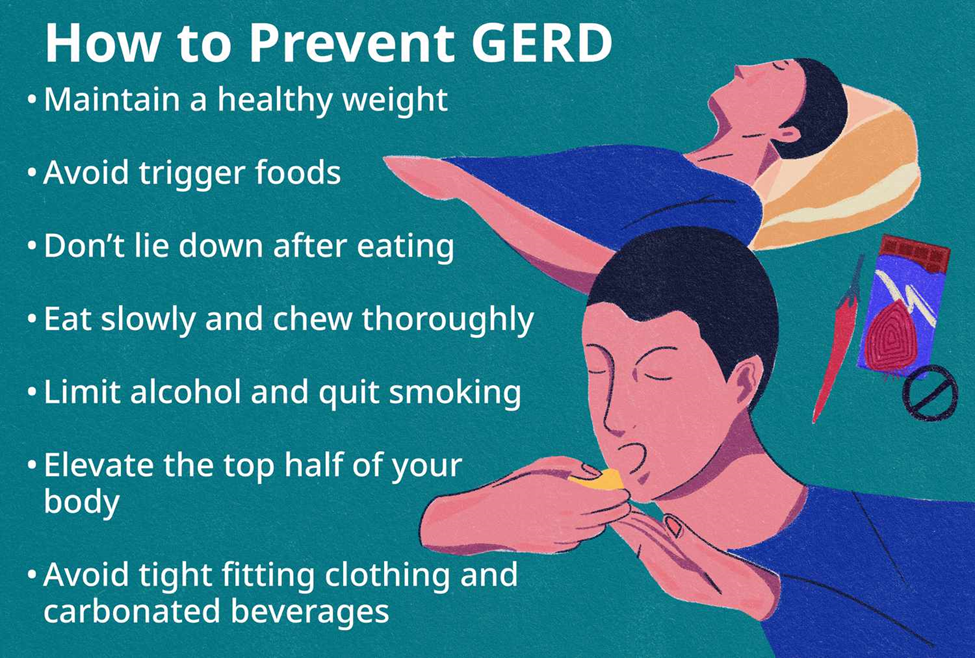A nurse is caring for an infant who has gastroesophageal reflux (GER). Which of the following actions should the nurse take to prevent regurgitation? (Select all that apply.)
Thicken the infant's formula with cereal.
Avoid giving the infant citrus juices.
Position the child with their head elevated after meals.
Place the infant's head on a soft pillow while sleeping.
Administer an antiemetic to the infant.
Correct Answer : A,B,C
A. Thicken the infant's formula with cereal: Thickening the infant's formula with cereal can help reduce the likelihood of regurgitation by increasing its viscosity and promoting better gastric emptying. This can help decrease the frequency and severity of gastroesophageal reflux episodes.
B. Avoid giving the infant citrus juices: Citrus juices are acidic and can exacerbate gastroesophageal reflux symptoms in infants. Avoiding citrus juices can help reduce the acidity of the stomach contents, potentially decreasing the likelihood of regurgitation.
C. Position the child with their head elevated after meals: Keeping the infant in an upright position with the head elevated after meals can help prevent regurgitation by reducing the likelihood of gastric contents flowing back into the esophagus. This position facilitates gravity-assisted digestion and minimizes pressure on the lower esophageal sphincter.
D. Place the infant's head on a soft pillow while sleeping: Placing the infant's head on a soft pillow while sleeping is not recommended as it increases the risk of suffocation and sudden infant death syndrome (SIDS). Infants should always be placed on their back to sleep in a flat, firm surface without pillows or soft bedding to reduce the risk of adverse events.
E. Administer an antiemetic to the infant: Administering an antiemetic to the infant is not typically indicated for the management of gastroesophageal reflux in infants, especially as a preventive measure. Antiemetics may have potential side effects and should only be used under the guidance of a healthcare provider for specific indications.

Nursing Test Bank
Naxlex Comprehensive Predictor Exams
Related Questions
Correct Answer is B
Explanation
A. The infant does not exhibit fear of strangers.
The infant does not exhibit fear of strangers is not a finding that the nurse should report to the provider, as this is a normal social behavior for a 6-month-old infant. Infants usually develop stranger anxiety between 8 and 12 months of age, when they become more aware of their surroundings and attachment figures.
B. The infant does not roll over from his abdomen to his back.
By 6 months of age, most infants can roll over in both directions— from their abdomen to their back and vice versa. The inability to roll over from abdomen to back may indicate a delay in gross motor skills development. This finding should be reported to the healthcare provider for further evaluation.
C. The infant does not pick up objects from the floor with his fingers.
By 6 months of age, infants typically begin to develop the ability to grasp and pick up objects using their fingers. This milestone is part of fine motor skills development. The inability to pick up objects from the floor with fingers may indicate a delay in fine motor skills and should be reported to the provider for further assessment.
D. The infant does not sit on the floor unsupported.
By 6 months of age, infants typically begin to develop the ability to sit unsupported for short periods. While some variability exists in when infants achieve this milestone, the inability to sit unsupported at 6 months may indicate a delay in gross motor skills development. This finding should be reported to the provider for further evaluation.
Correct Answer is D
Explanation
A. Temperature of 38°C (100.4°F):A mild fever is not a contraindication for the MMR vaccine. In fact, a low-grade fever is common after immunizations and does not warrant withholding the vaccine.
B. Family history of sudden unexpected infant death (SUID): While a family history of SUID may be concerning, it is not a contraindication for administering the MMR vaccine. This history would not directly impact the safety or effectiveness of the vaccine.
C. Taking an antihistamine for seasonal allergies: Taking an antihistamine for seasonal allergies does not typically contraindicate the administration of the MMR vaccine. Antihistamines are generally safe to use with vaccines, and they do not interfere with the immune response to the vaccine.
D. Receiving prednisone for nephrotic syndrome:Prednisone is an immunosuppressive medication. Children receiving high-dose corticosteroids (such as prednisone) should avoid live vaccines like MMR
Whether you are a student looking to ace your exams or a practicing nurse seeking to enhance your expertise , our nursing education contents will empower you with the confidence and competence to make a difference in the lives of patients and become a respected leader in the healthcare field.
Visit Naxlex, invest in your future and unlock endless possibilities with our unparalleled nursing education contents today
Report Wrong Answer on the Current Question
Do you disagree with the answer? If yes, what is your expected answer? Explain.
Kindly be descriptive with the issue you are facing.
